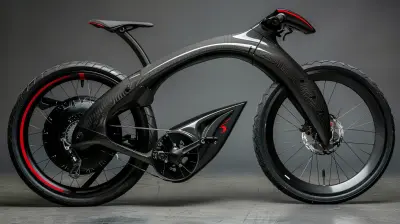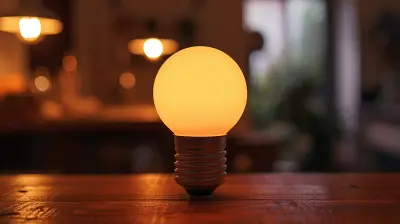How Blockchain is Powering Renewable Energy Markets
6 January 2025
The rise of renewable energy is no longer just a trend; it's a necessity. With our planet facing serious environmental challenges, the push for clean, sustainable energy solutions is more urgent than ever. But here's the thing—while renewable energy sources like solar and wind power are fantastic, they come with their own set of hurdles. From managing supply and demand to ensuring transparency and trust in the energy market, the renewable sector is ripe for innovation.
Enter blockchain. Yep, blockchain isn't just about cryptocurrencies like Bitcoin anymore. It's now finding its way into industries you wouldn’t expect, and renewable energy is one of them. In this post, we’ll dive into how blockchain is powering renewable energy markets and why it could be the game-changer we didn’t know we needed.

What is Blockchain?
Before we jump into its impact on renewable energy, let’s have a quick refresher on what blockchain actually is. Think of blockchain as a digital ledger, but instead of it being centralized and controlled by a single company or organization, it's decentralized. That means no single person or entity is in charge. Instead, multiple participants (called nodes) validate and record transactions, making the system highly transparent and secure.Because of its decentralized nature, blockchain is practically tamper-proof. Every transaction is recorded on a "block," and once a block is added to the chain, it's there forever. No one can go back and alter it without the consensus of the whole network. This makes blockchain perfect for industries where trust, transparency, and security are paramount.
Blockchain Meets Renewable Energy: A Perfect Match?
At first glance, it might seem like blockchain and renewable energy don’t have much in common. But when you think about the challenges facing the renewable energy market, blockchain starts to make a lot of sense. Let’s break down how blockchain technology is solving some of the biggest problems in the renewable energy sector.
The Challenges in Renewable Energy Markets
The renewable energy market has a lot going for it, but it's not without its challenges. Some of the main issues include:1. Energy Distribution & Storage: Solar and wind energy are intermittent. The sun doesn’t always shine, and the wind doesn’t always blow. This makes it difficult to ensure a constant energy supply.
2. Trust and Transparency: Renewable energy certificates (RECs) are used to verify that energy comes from a green source. However, verifying the authenticity of these certificates can be tricky, especially when they're passed through multiple intermediaries.
3. Energy Trading: Traditional energy markets often require large intermediaries that control the pricing and distribution. This can result in inefficiencies and higher costs for consumers.
4. Grid Management: The current energy grid system wasn’t designed for decentralized energy production. Managing energy from thousands of small producers—like home solar panels—can be a logistical nightmare.
These problems call for a technology that can handle decentralization, provide transparency, and improve efficiency. Spoiler alert: Blockchain ticks all these boxes.

How Blockchain is Solving These Problems
Let’s take a closer look at how blockchain is stepping up to tackle the challenges in renewable energy markets.1. Peer-to-Peer (P2P) Energy Trading
Imagine you have solar panels on your roof and produce more energy than you need. In a traditional setup, this excess energy would go back to the grid, and you’d only get a tiny credit for it from your energy provider. But what if you could sell that extra energy directly to your neighbor or someone across town—without needing a middleman?With blockchain, this is entirely possible. Blockchain enables Peer-to-Peer (P2P) energy trading, where individuals can trade their excess renewable energy directly with others. This creates a decentralized marketplace where energy producers and consumers can interact freely, cutting out intermediaries and lowering costs.
Here’s how it works:
- A blockchain platform records how much energy is produced and consumed.
- Smart contracts (self-executing contracts with terms coded into them) are used to automatically handle the trading process.
- You can sell your excess solar energy to someone else in the network, all in real-time and without needing a third-party utility company.
This system makes energy trading more efficient, transparent, and cost-effective.
2. Enhanced Transparency with Renewable Energy Certificates (RECs)
One of the biggest challenges in the renewable energy market is ensuring that the energy labeled as “green” actually comes from renewable sources. Enter Renewable Energy Certificates (RECs). These certificates are issued to verify that a certain amount of energy was produced from a renewable source, like solar or wind. But the current system is flawed. It’s difficult to track the authenticity of RECs as they pass through multiple hands.Blockchain can fix this by creating a transparent and tamper-proof system for tracking RECs. By using blockchain, we can ensure that each certificate is legitimate and traceable from its origin to its final destination. This means there’s no room for fraud, and consumers can trust that the energy they’re buying is truly green.
3. Grid Management and Decentralization
One of the most intriguing possibilities for blockchain in the renewable energy market is its potential for decentralized grid management. Right now, the energy grid is centralized, meaning a handful of large companies control how energy flows. This system wasn’t designed to handle thousands of small producers (like homes with solar panels), which can lead to inefficiencies and even grid instability.Blockchain could enable a more decentralized grid, where energy producers of all sizes (from large wind farms to individual homeowners with solar panels) can contribute energy. The blockchain would keep track of who’s producing and consuming energy, enabling a more balanced and efficient grid system.
This could also pave the way for microgrids, which are small-scale grids that can operate independently from the main grid. Microgrids can be powered by local renewable energy sources, and blockchain would help manage the flow of energy within them.
4. Smart Contracts for Efficiency
Smart contracts are a game-changer when it comes to automating processes in the renewable energy market. A smart contract is a self-executing contract with the terms of the agreement written into code. In the context of renewable energy, smart contracts can be used to automate energy trading, billing, and even grid management.For example, a smart contract could automatically execute an energy trade between two parties once certain conditions are met (like when one party produces excess energy). This eliminates the need for manual intervention and reduces the risk of human error.
Smart contracts can also be used to automate payments. Instead of waiting for your energy bill at the end of the month, a smart contract could automatically deduct or deposit funds based on your energy usage in real-time.

Benefits of Blockchain in Renewable Energy Markets
So, why should we care about blockchain’s role in renewable energy? The potential benefits are huge:- Increased Transparency: Blockchain ensures that all transactions, whether they’re energy trades or renewable energy certificates, are transparent and traceable.
- Cost-Reduction: By cutting out intermediaries and enabling P2P trading, blockchain could lower energy costs for consumers.
- Faster Transactions: Blockchain operates in real-time and can process transactions much faster than traditional systems.
- Enhanced Security: Blockchain’s decentralized and tamper-proof nature makes it extremely secure, reducing the risk of fraud.
- Empowerment of Small Producers: Blockchain allows individuals and small producers to participate in the energy market, creating a more decentralized and democratic system.
Real-World Examples of Blockchain in Renewable Energy
You might be thinking, “Okay, this sounds great in theory, but is anyone actually doing this?” The answer is yes! There are already several projects and companies using blockchain to revolutionize the renewable energy sector.- Power Ledger: Based in Australia, Power Ledger is a blockchain platform that enables P2P energy trading. Users can buy and sell excess solar energy within their local communities.
- WePower: This company is using blockchain to help renewable energy producers raise capital by selling their future energy production in the form of tokens.
- LO3 Energy: LO3 Energy is developing microgrids powered by blockchain technology. Their goal is to create a decentralized energy system where local communities can produce and trade their own energy.
Challenges and Limitations of Blockchain in Renewable Energy
Of course, blockchain isn’t a magic bullet. While it offers a lot of promise, it also faces some challenges:- Energy Consumption: Ironically, blockchain itself can be energy-intensive, especially older systems like Bitcoin’s proof-of-work model. However, newer blockchain models like proof-of-stake are more energy-efficient.
- Scalability: Blockchain platforms can struggle with scalability, especially as the number of transactions increases. Speed and efficiency could become an issue as more users join the network.
- Regulatory Hurdles: The energy market is heavily regulated, and integrating blockchain into existing systems may require significant changes in policy.
The Future of Blockchain in Renewable Energy
Despite the challenges, it’s clear that blockchain has enormous potential to reshape the renewable energy market. As the technology matures and more companies and governments come on board, we could see blockchain becoming a key player in the energy sector.The future of energy might not just be renewable—it could be decentralized, transparent, and powered by blockchain.
all images in this post were generated using AI tools
Category:
Green TechnologyAuthor:

Pierre McCord
Discussion
rate this article
11 comments
Marissa McEachern
Exciting times ahead! Blockchain is revolutionizing renewable energy markets, empowering transparency and efficiency. This innovative technology not only fosters sustainability but also paves the way for a cleaner, greener future. Let's harness this potential together!
April 4, 2025 at 5:00 PM

Pierre McCord
Thank you! I completely agree—blockchain is indeed a game-changer for renewable energy, driving both transparency and sustainability. Exciting times indeed!
Zariah Oliver
Blockchain and renewable energy: it's like peanut butter met jelly at a tech conference! Who knew these two would team up to create a deliciously transparent market? Imagine solar panels and crypto coins dancing together under the sun, powering our future while jamming to eco-friendly beats. Let’s ride this green wave!
February 3, 2025 at 3:50 AM

Pierre McCord
Thanks for the fun analogy! The synergy between blockchain and renewable energy truly is a game-changer for transparency and efficiency in the market. Let's keep riding that green wave together!
Maren Brown
Blockchain's transparency and efficiency can revolutionize renewable energy markets, fostering trust and collaboration while enabling decentralized energy trading for a sustainable future.
January 27, 2025 at 6:04 AM

Pierre McCord
Thank you for your insightful comment! Indeed, blockchain's potential to enhance transparency and enable decentralized energy trading is crucial for advancing renewable energy markets and promoting sustainability.
Georgina Ramirez
Blockchain's transparent and decentralized nature can revolutionize renewable energy markets by enhancing trust, streamlining transactions, and fostering innovation. This synergy not only empowers consumers but also accelerates the global shift towards sustainable energy solutions.
January 17, 2025 at 5:07 PM

Pierre McCord
Thank you for your insightful comment! I completely agree that blockchain's transparency and decentralization have the potential to significantly enhance trust and efficiency in renewable energy markets, driving both innovation and sustainability.
Lacey Carter
This article beautifully highlights the synergy between blockchain technology and renewable energy. It’s inspiring to see innovation paving the way for a sustainable future. Great read!
January 10, 2025 at 4:34 PM

Pierre McCord
Thank you! I'm glad you found the article inspiring and valuable in showcasing the potential of blockchain in renewable energy. Your support means a lot!
Heidi McFadden
This article compellingly illustrates how blockchain technology enhances transparency and efficiency in renewable energy markets. By facilitating peer-to-peer transactions and verifying sources, blockchain not only mitigates fraud but also empowers consumers. However, scalability and energy consumption of blockchain systems themselves warrant further exploration to ensure sustainable growth in this domain.
January 9, 2025 at 5:00 PM

Pierre McCord
Thank you for your insightful comment! You’re absolutely right about the potential of blockchain to enhance transparency and empower consumers in renewable energy markets. I appreciate your emphasis on the need for further exploration of scalability and energy consumption to ensure sustainable growth.
Pamela Blevins
Blockchain's decentralized framework could redefine energy markets by enhancing transparency and trust, empowering consumers to trade renewable energy directly. This technological synergy not only accelerates the transition to sustainable resources but also fosters a more equitable energy landscape for all.
January 8, 2025 at 5:53 PM

Pierre McCord
Thank you for your insightful comment! Indeed, blockchain's potential to enhance transparency and empower consumers is pivotal for advancing renewable energy markets and fostering equity.
Lincoln Gonzalez
This article brilliantly highlights the intersection of blockchain and renewable energy. It underscores the potential for greater transparency and efficiency in energy markets, which could drive sustainable practices. However, it's essential to consider the challenges of integration and the need for regulatory frameworks to fully realize this promise.
January 7, 2025 at 4:30 PM

Pierre McCord
Thank you for your insightful comment! I completely agree that while the potential of blockchain in renewable energy is exciting, addressing integration challenges and establishing robust regulatory frameworks are crucial for unlocking its full benefits.
Franklin McCord
Exciting times ahead! Blockchain is revolutionizing renewable energy by enhancing transparency and fostering trust among stakeholders. This innovative technology not only empowers consumers to make sustainable choices but also accelerates the transition to a greener future. Together, we can harness this potential for a cleaner planet!
January 7, 2025 at 5:18 AM

Pierre McCord
Thank you! We share your enthusiasm for how blockchain can transform renewable energy, driving transparency and empowering sustainable choices for a greener future.
Nala Mendoza
Exciting advancements! Blockchain's role in renewable energy is truly inspiring.
January 6, 2025 at 6:03 PM

Pierre McCord
Thank you! I'm glad you find it inspiring—blockchain has incredible potential to transform renewable energy markets!
Tyler McGuffin
Blockchain enhances transparency and efficiency, revolutionizing the renewable energy sector effectively.
January 6, 2025 at 4:28 AM

Pierre McCord
Thank you! I'm glad you found the article insightful. Blockchain truly is a game-changer for transparency and efficiency in renewable energy markets.
MORE POSTS

The Evolution of Electric Bicycle Technology: What to Expect Next

Networking Strategies for Attending Tech Conferences Virtually

The Role of Digital Twins in Enhancing Gadget Development

Kindle vs. Kobo: Which E-Reader Should You Choose?

The Most Anticipated Tech Events to Keep on Your Radar

The Next Leap in Wireless Charging Technology

Transform Your Space: The Best Smart Lighting for Home Entertainment

Cloud Storage and Data Privacy: Risks and Solutions